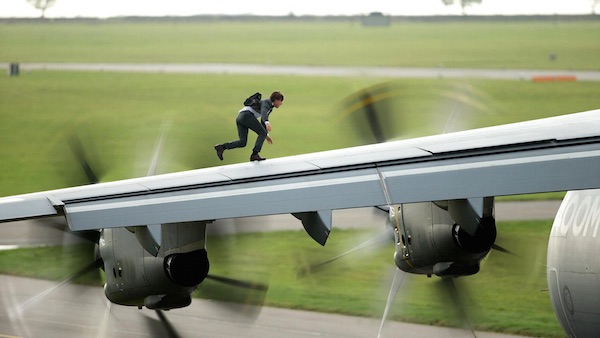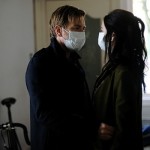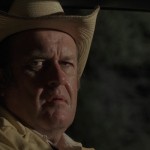Mission: Impossible: Rogue Nation Review
Five films into the Mission: Impossible series, and you sort of think you know everything you’re going to get—death-defying action, lots of Tom Cruise faces, masks, exotic locations, etc. It’s a variation on the James Bond theme, just like the Fast & Furious franchise has become a variation on the Mission: Impossible theme.
Rogue Nation repeats a lot of the same story beats that made its predecessors successful and enjoyable, but it also tweaks the formula in slight but satisfying ways. The film has a deep mistrust of government that effects our heroes’ ability to carry out their various missions. Those missions, then, are very rarely sanctioned. The film is as polished as the impossible missions one through four, but it’s also a lot less hopeful. There’s a romanticism that’s missing from Rogue Nation (which is a little ironic considering romance plays a bigger part in this film than any in the series besides M:I 3). That all leads to a longer film, a slightly less fun film, but it’s still a film that’s impossibly entertaining.
Rogue Nation opens in the franchise’s most Bond-esque way yet—an utterly superfluous, but admirably death-defying stunt that leads into the film’s title sequence. It’s the plane scene the film has hyped so extensively in its marketing, and it’s great, but only once it’s done does the film begin in earnest at a London record store.
It’s presented as a familiar set-up. Cruise’s Ethan Hunt, alone, listens to his next directive. It turns out a lead he’s hunted for the better part of a year is a hot one. A stateless agency known as “the Syndicate” has been carrying out acts of terror and destabilization all over the world. Seemingly unconnected incidents have a commonality, and it’s Hunt’s job to find out who’s behind this group and put a stop to them. Or is it?
Turns out he’s listening to the voice of the Syndicate’s leader, Solomon Lane (Sean Harris), who’s set up an elaborate ruse in order to tell Hunt how right he was before capturing him. Meanwhile, in Washington, William Brandt (Jeremy Renner) is called to testify on behalf of IMF’s unorthodox and seemingly reckless methods. Because he (conveniently) say much, the committee he’s before takes the side of CIA Director Alan Hunley (Alec Baldwin) and shuts down IMF. Hunt, along with every other active agent, is expected to come in from the cold. But after escaping the Syndicate’s clutches with the help of a possible new friend (Rebecca Ferguson’s Ilsa Faust), he has little interest in a desk job. He wants, needs to find out more about this dangerous organization that, unlike past enemies, seems faster, smarter, and better than him.
There are a lot of really interesting individual scenes that add up to a cohesive, thematically interesting whole, but one can’t help but wish the story itself was tighter. The film’s title alludes to the Syndicate—a group of like-minded individuals working toward a singular political purpose, despite the fact that they don’t call one place home. You could say the same thing about Ethan Hunt as an individual, his colleagues (Brandt, Ving Rhames’ Luther Stickell, and Simon Pegg’s Benji), and Ilsa. As such, there are a lot of working parts, and each of these parts is working for a different purpose. These purposes often conflict, but sometimes they benignly cross paths. It’s a complex, webby sort of narrative that’s fun to watch unfold, but it also feels cumbersome and unnecessarily convoluted. Particulary when it tries to work in its handful of big action set pieces, it feels long in the tooth.
Out of context, though, these action scenes are pretty brilliant. The Vienna opera sequence, in particular, features fantastic editing and choreography. It also happens to come early enough in the film that it still feels fresh and urgent. The underwater heist is great but adds a good 30 minutes to the film between its execution and the story beats needed to take us from its act to the final one. And the noir-inspired conclusion—well, it looks great (Robert Elswit is the film’s cinematographer), but these films never really knew how to wrap up especially well.
The film’s best assets are Rebecca Ferguson and the character of Ilsa. Thea actress is fantastic and really charming. The character is totally unnerving, and her true intentions aren’t really clear until the film reaches its end. One gets the sense that she doesn’t even know what she’s going to do, particularly late when she’s compelled to do something that will seemingly seal her fate. Like the best cinematic spies, she’s in so deep she doesn’t even know what end is up, and maybe when one side pushes her too far, she’ll swap allegiances permanently because it’s the only way to survive. That’s high drama, and it keeps the film going through some otherwise rough patches of story.
Ethan Hunt is forced to face questions of whether he’s finally met his match, which is also inherently interesting. His loyalty, too, is called into question, though the Brandt/Hunley material is second-rate Bourne at best. Still, Rogue Nation moves briskly enough that when you might be tempted to check your watch, it’ll rope you back in easily with a twist or a chase. I can’t say it’s my favorite Mission: Impossible film—that’s J.J. Abrams’ third film, and it’s not particularly close—but it’s worthy of the franchise and has enough steam to keep me excited for the inevitable next installment.
















